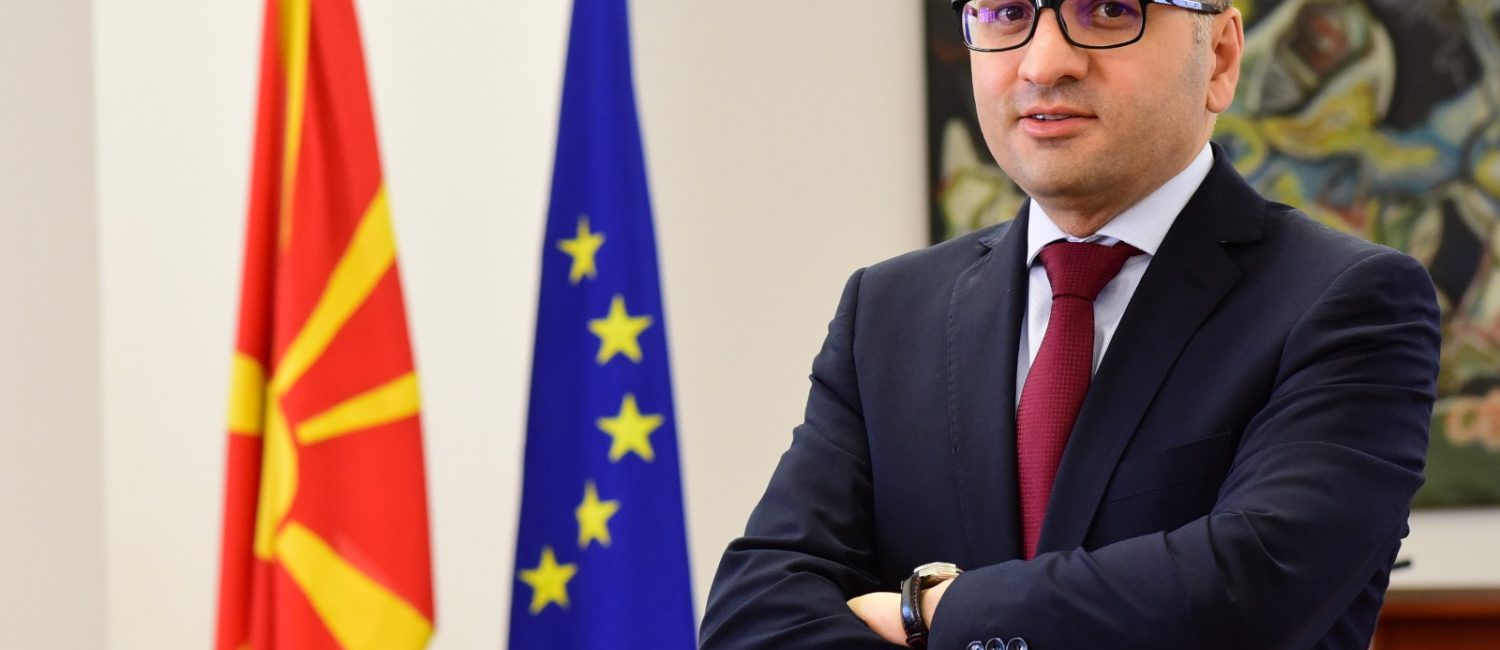27th November 2022, Skopje – In his interview for DW, Minister of Finance, Fatmir Besimi assures that the Budget prepared for the coming year is not too ambitious. Will he manage to finance it without any over-indebtedness?
Macedonian economy will continue on its fiscal consolidation path in the coming year as well. One fifth of the funds in the Budget, amounting to record high EUR 5.3 billion, envisages anti-crisis measures and investments. Minister of Finance, Fatmir Besimi, assures that the proposed Budget will provide for development and energy stability, announcing new platforms for a more favourable and more efficient borrowing. Tax base will be broadened, but he reveals no details yet.

DW: Mister Besimi, you envisage around EUR 250 million in 2023 draft Budget as support to the citizens and the business sector. When and how will these funds be distributed?
Fatmir Besimi: 2023 draft Budget provides an adequate response to the challenges the global energy and price crisis would pose next year. It is actually a special program in the Budget, amounting to EUR 250 million. Around Denar 10 billion is envisaged for measures aimed at supporting the vulnerable categories of citizens and the most affected sectors in the economy (which is by Denar 3 billion more compared to this year’s Supplementary Budget). Moreover, Denar 4.6 billion is projected as support for the energy sector for increased generation of electricity by the domestic capacities. What is essential is to provide stable supply of electricity and heating energy for the citizens and the business sector. Hence, we continue the support we have extended to the energy and electricity sector in the course of last and this year, estimated at around EUR 300 million. As regards the funds envisaged for anti-crisis measures, we have ensured a buffer for adequate anti-crisis policies and measures in the course of the year, as per the developments and the needs. Fiscal policy in the past three years responded adequately to the challenges the COVID-19 induced pandemic posed, followed by the energy crisis and the effects from the deepening of the geopolitical tensions and the war in Ukraine. As a result of such policies, blow on the economic activity was cushioned many times over, which has been also recognized in the IFI’s reports.
DW: The funds are part of the Budget amounting to all-time record high of nearly EUR 5.3 billion, with record high deficit of almost EUR 700 million. Your forecast higher expenditures, as well as higher revenues. Where does such optimism stem from when it comes to managing to collect EUR 4.6 billion?
Fatmir Besimi: I would like to correct you about the deficit, since the statement of it being record high is not correct. Since the pandemic onwards, i.e. since 2020 each coming year, budget deficit has been narrowed. It is in line with our commitment to fiscal consolidation, i.e. gradual reduction of the deficit – or the gap between the revenue and the expenditure side of the Budget, without thereby adversely affecting the economic activity. Budget deficit is also narrowed in the draft Budget, i.e. it is by 0.7 percentage points lower compared to current year’s projections, accounting for 4.6% of GDP. Our medium-term commitment, i.e. in the next several years, is to reduce the budget deficit to below 3%, i.e. below the Maastricht criterion. It is in line with our efforts to public finance sustainability. Next year’s budget revenues are projected in the amount of Denar 282.1 billion. Such projection is based upon revenue performance throughout 2022, expectations for economic growth and improved efficiency and effectiveness of the public revenue collection system.
I would underline that combat against informal economy will be uncompromising, with measures and activities being planned for reduction of tax evasion. Digitalization and process simplification is our goal, hence we have also envisaged measures to introduce advanced technologies in public revenue collection, as well as modernization and automation of the working processes. Activities will be undertaken for enhancing the institutions’ capacities for revenue collection, increased and more efficient collection of tax revenues, as well as strengthening the institutional coordination. Moreover, strengthening the existing tax regulations and ensuring a fair and efficient tax system in the country is yet another vital step.
DW: Are you maybe somehow playing the higher inflation card, thus generating more budget revenues?
Fatmir Besimi: All relevant international and domestic financial institutions project for the inflation to slow down next year both globally and in our country. Hence, the World Bank and the International Monetary Fund forecast inflation cut in half in 2023 compared to this year or, if projected at 12.1% and 10.6% respectively this year, it will drop to 6.1% and 4.5% next year. Most recent forecasts on the trends on the global markets show that price pressures will gradually alleviate, since it is expected for food and oil prices to drop in the course of next year.
DW: Pensions and wages will increase, including the minimum wage. Do you believe it is a sound policy to increase them, in particular the minimum wage, in times of high inflation?
Fatmir Besimi: As per the economic theory, any increase in wages, without being accompanied by an increased productivity, will cause inflationary pressures, which in case of price pressures can further refuel inflation. However, on the other hand, when talking about growth, in particular increase of the minimum wage, it should be observed in yet another context, as support in times of this crisis. Therefore, in order to manage this process and have no unrealistic and unjustified demands in future, we have introduced a system under the Minimum Wage Law. According to the systemic solution, minimum wage will be harmonized with the costs of living and the increase of the average wage once a year. It is a systemic and just solution aimed at maintaining the living standard of the citizens.
DW: Are the tax revenues forecasted under the tax reform you strive for envisaged in the budget projections?
Fatmir Besimi: Tax reform we have commenced, based on the adopted Strategy which, on the other hand, is just one phase of the overall reform, is aimed at ensuring fair, efficient, transparent and modern tax system, based on modern digital technologies and innovations in taxation, geared towards attaining accelerated, inclusive and sustainable economic growth. The concept envisages gradual implementation of the envisaged draft solutions. Hence, in 2023, projection for total tax revenues, amounting to Denar 162.6 billion, includes the expected fiscal effects from the implementation of the tax reforms in the field of VAT, profit tax and PIT. For the sake of clarity and avoiding any confusion, it is not about introducing any new taxes, but rather broadening the tax base and revising the tax exemptions. At the moment, final consultations about the draft solutions take place at the Ministry of Finance and we will present detailed information soon.

Deutsche Welle: Public debt continues to grow. This is no a matter of concern but rather a typical situation for more or less all economies. However, should not it raise concerns about our economy, recording a very modest growth? Previously, public debt exceeding EUR 5 billion was considered to be too risky, while at present, it has already reached EUR 7.3 billion.
Fatmir Besimi: When talking about the public debt, several things should be taken into account: what is the purpose, the conditions and the overall sustainability as regards the debt servicing, i.e. the capacity of the economy to repay the loans. It is already a well-known fact that due to the crisis, public debt picked up in many countries due to the need to pursue a more expansive fiscal policy. During the pandemic, debt recorded high growth rates in some of the developed and in most of the developing economies. In our country, as a result of the strong fiscal response in times of pandemic, the public debt rose by ten or so percentage points. However, as of the following year already, these trends started to stabilize, whereby in the course of this year, as per the latest data about the third quarter of 2022, the public debt accounted for 58.6% of GDP, i.e. below the Maastricht criterion, with the general government debt accounting for 49.8% of GDP. Government and Ministry of Finance manage the public finances in transparent and accountable manner, thereby paying attention to the costs of the total public debt portfolio and the maturity thereof.
With respect to the efficiency as regards the absorption of the funds, I will hereby emphasize that most of them were geared towards financing the anti-crisis measures, as well as encouraging the economic activity through public investments and support for the private sector. Interest attained on such borrowing is also worth mentioning. Thus, Eurobond was issued with historic low interest rate of 1.625% in 2021. This year, despite enormously high costs on the financial markets, the financing was closed with average interest rate of 3.2%, thus the savings based on interest alone, amounted to EUR 40 million on annual basis. We are committed to responsible and accountable public debt management, as evident from the new Organic Budget Law, which stipulates the introduction of fiscal rules on the public debt and the deficit, also regulating the establishment of an independent body, the Fiscal Council, which will supervise the implementation of the fiscal rules.
Deutsche Welle: Are we going to be able to service the debt? How will we be able to repay the outstanding loans, given the considerably low value added generated by our domestic economy?
Fatmir Besimi: Budget is liquid and all liabilities upon the policies contained therein, as well as the debt liabilities are regularly and timely serviced from both domestic and foreign sources. We will remain committed thereto in the next year as well. Decision of the IMF’s Board of Director to make available EUR 530 million to our country, via the Precautionary and Liquidity Line – PLL, speaks in favor of our sound economic policies, since such financial instrument is made available only to countries with sound economic fundamentals, which are expected to resume pursuing sound economic policies in the next period as well. This gives a great credit to the economic policies our Government implements, being also a good signal for investors.
Deutsche Welle: What are the most favourable borrowing options at present? We are witnessing the warnings about the sources becoming increasingly expensive.
Fatmir Besimi: Policy we implement as regards ensuring the budget deficit financing and repaying the foreign and domestic debt, is focused on providing funds under the most favourable terms and conditions. This year, when cost of capital on the financial markets became high, the last years’ deposit provided for more comfortable position, thus making room to monitor the developments and step in on the capital market, in times when the terms and conditions were most optimal therefor. Next year, the borrowing on the domestic market is projected in the amount of Denar 33.6 billion. It is planned for the funds to be provided under favourable terms and conditions, and a new, more sophisticated platform for carrying out the primary issues of government securities – Bloomberg, will be put into place, thus providing for increased participation of foreign investors on the domestic market. Foreign borrowing is planned to be carried out by issuing debt securities on the international capital market, via tranche disbursement under the already approved IMF Precautionary and Liquidity Line – PLL, as well as via development loans under favourable terms and conditions, extended by foreign financial institutions and credit lines intended for project and budget financing. Everything is always thoroughly analyzed when opting for the source of financing, as was the case this year, when registered notes on the German market, known as Namensschuldverschreibungen, i.e. NSV, were issued for the first time. For the purpose of prudent public finance management, possibility for active debt portfolio management through liability management activities, will be also considered. In order to continuously strengthen the government securities financial market and pursue the worldwide practice, Ministry of Finance undertakes activities aimed at diversifying the sources of financing and introducing new types of financing instruments, which will be differently applied. It is a matter of “development bonds”, “green bonds”, “project bonds”, as well as development bonds for the citizens.
Deutsche Welle: Capital investments projected in 2023 have been highest so far, amounting to almost EUR 800 million. Will we ultimately become witnesses of their complete implementation, since we are aware of the manner of their realization and the amount thereof?
Fatmir Besimi: 2023 Budget is designed in line with the golden rule of government spending, i.e. expenditures related to capital investments are projected to be higher than the deficit, thus speaking in favor of its development component and our commitment to accelerating the economic growth in the medium term. Over the last two years, capital expenditure execution has reached approximately 80%, being generally among the solid performance of capital expenditure projections in the past years. However, it is also significant that the absolute amount increases. Thus, the capital expenditure execution amounted to Denar 17 billion in 2016, while reaching Denar 23.4 billion in 2021, with Denar 32.2 billion being projected under the 2022 Supplementary Budget. Over 2022, capital expenditure execution has exceeded 50%, expected to be intensified in 2023 as well, as it was practiced during the last months of this year.
Intensified implementation dynamics is also expected as regards the railway line towards Bulgaria as part of Corridor 8, as well as the road sections along Corridor 8, Kichevo – Bukojchani, Struga – Kjafasan, Gostivar – Kichevo, Prilep – Bitola. Energy projects are also gaining momentum due to the crisis. Introduced CAPEF mechanism is an instrument, which encourages budget users to implement the respective investment projects. As a well-known fact, it has been applied for a second year already, whereby more funds are allocated to the institutions showing better execution, while those showing underperformance are being withdrawn the funds they have not used. In addition, a novelty aimed at speeding up the project implementation, being foreseen under the new Organic Budget Law is the introduction of a new organizational Public Investment Management Assessment Unit (PIMA), within the Ministry of Finance. When preparing the Budget, all budget users should submit pre-feasibility or feasibility study to the Ministry of Finance, pertaining to all new proposals for major investments Committee is envisaged at a Government level, which will determine the priority of the projects for their financing. As per the Growth Acceleration Financing Plan, projects will be implemented by the existing Project Implementation Units (PIUs), with the possibility to establish additional PIUs for certain new projects. Implementation of the projects of highest priority will be assisted by the Delivery Unit, with the Project Implementation Units (PIUs) being supported thereby through joint resolution of issues related to specific challenges, while the Unit will directly report to the President of the Government, thus carrying out a holistic measurement of the attained progress and outcome. Such a mechanism will yield good results.
Deutsche Welle: Minister of Finance is “Custodian of the Budget”. Could the citizens rest assured that there will be sufficient funds to survive the upcoming year?
Fatmir Besimi: Even in times of the greatest global economic crisis, since the Great Depression onwards, i.e. the COVID-19 induced crisis, we proved that all liabilities were serviced in timely and uninterrupted manner, even before the due term, given hat during the pandemic, the pensions were paid even before the end of the respective month. Funds were also provided for anti-crisis measures as support to the citizens and the companies, increase of wages and pensions, as well as for the business sector and the competitiveness thereof via series of policies and subsidies. This most accurately speaks in favor of this Government’s capacity to manage crisis of huge proportions.
Source: Deutsche Welle
















